Archive for the ‘January 2013’ Category
4月 3, 2021

10 YEARS – NPC十岁了!
10 years ago, Yi Sha 伊沙 began to present one poem each day on Chinese social media. This has become a representative collection of new poetry in the new century, aptly named NPC, New Poetry Canon 新世纪诗典.
Eight years ago I began to look for NPC poems each day, translating more and more into German and English. In 2014 my own poetry appeared on NPC for the first time. After two books of Yi Sha’s poetry, I have now published, along with Juliane Adler, the first book of a 4-volume-series of NPC poetry in Chinese and German. Here are the contents:


BRETT VOLLER NÄGEL 布满钉子的木板
NPC-Anthologie 新世纪诗典
Band 1: A–J. Gedichte
Chinesisch/Deutsch
Übersetzt von Martin Winter
Herausgegeben von Juliane Adler und Martin Winter
ISBN 978-3-903267-00-8
Lieferbar
€ 24.00
Bestellen
ORDER HERE













标签:3A, A Ti, A Wen, A Wu, A Yu, AAA, Ai Hao, Ai Mi, An Qi, anthologies, anthology, Ao Yuntao, Bai Diu, Bai Li, Bei Dao, Bei Lang, Benben S.K., book, Cai Xiyin, Caiwong Namjack, Caomu Xin, Cha Wenjin, Chang Yuchun, Chao Hui, Che Qianzi, Chen Moshi, Chen Yanqiang, Chen Yulun, Chen Yunfeng, Cheng Bei, Cheng Tao, Chun Sue, Cong Rong, 独禽, 白立, 秦非, 程涛, 笨笨 s.k., 第广龙, 簡天平, 纪彦峰, Da Duo, Da You, Dai Guanglei, Dechen Pakme, Denis Mair, Di Guanglong, Dong Yue, Du Qin, Du Sishang, Du Zhongmin, Duo Er, Eryue Lan, Ezher, 耿占坤, 胡赞辉, 胡泊, 金山, 艾米, 艾蒿, 艾孜哈尔, 草木心, 蒋彩云, 蔡喜印, 蔣雪峰, 蔣濤, 阿煜, 阿吾, 阿嚏, 阿文, 陈玉伦, 陈衍强, 陈默实, 陈云峰, 虎子, 韩敬源, 韩永恒, 韩东, 高歌, 鬼石, 谷驹休, 鴻鴻, 鸿鸿, 黄礼孩, 黄翔, 黄开兵, 黄海, 黄海兮, 车前子, 龚志坚, Fa Xing, Fei Qin, Feng Xuan, Gang Jumu, Gao Ge, Geng Zhankun, German, Gong Zhijian, Guangtou, Gui Shi, Hai An, Hai Jing, Hai Qing, Han Dong, Han Jingyuan, Han Yongheng, Hong Junzhi, Hou Ma, Houhou Jing, Hu Bo, Hu Zi, Huang Hai, Huang Kaibing, Huang Lihai, Huang Xiang, Hung Hung, Huzi, Ji Yanfeng, Jian Tianping, Jiang Caiyun, Jiang Erman, Jiang Rui, Jiang Tao, Jiang Xinhe, Jiang Xuefeng, Jianghu Hai, Jin Shan, Jun Er, language, languages, literature, media, people, poetry, poets, social media, time, translation, yi sha, 光头, 公子琴, 冈居木, 冯谖, 北岛, 北浪, 发星, 君儿, 大友, 大朵, 姜馨贺, 姜二嫚, 安琪, 常遇春, 德乾恒美, 成倍, 才旺南杰, 摆丢, 敖云涛, 春树, 朝晖, 朵儿, 杜思尚, 杜中民, 查文瑾, 梅丹理, 江睿, 江湖海, 洪君植, 海菁, 海青, 海岸, 三个A, 东岳, 二月蓝, 从容, 代光磊, 侯马
发表在 2000s, 2001, 2002, 2003, 2004, 2005, 2006, 2007, 2008, 2009, 2010, 2010s, 2011, 2012, 2013, 2014, 2015, 2016, 2017, 2018, 2019, 2020, 2021, 20th century, 21st century, April 2011, April 2012, April 2013, April 2014, April 2015, April 2016, April 2017, April 2018, April 2019, April 2020, April 2021, August 2011, August 2012, August 2013, August 2014, August 2015, August 2016, AUGUST 2017, August 2018, August 2019, August 2020, December 2011, December 2012, December 2013, December 2014, December 2015, December 2016, December 2017, December 2018, December 2019, December 2020, Februar 2017, February 2012, February 2013, February 2014, February 2015, February 2016, February 2018, February 2019, February 2020, February 2021, January 2012, January 2013, January 2014, January 2015, January 2016, January 2017, January 2018, January 2019, January 2020, January 2021, July 2011, July 2012, July 2014, July 2015, July 2016, JULY 2017, July 2018, July 2019, July 2020, June 2011, June 2012, June 2013, June 2014, June 2015, June 2016, June 2017, June 2018, June 2019, June 2020, Literadio, March 2011, March 2012, March 2013, March 2014, March 2015, March 2016, March 2017, March 2018, March 2019, March 2020, March 2021, May 2011, May 2012, May 2013, May 2014, MAY 2015, May 2016, May 2017, May 2018, May 2019, May 2020, Middle Ages, November 2011, November 2012, November 2013, November 2014, November 2015, November 2016, November 2017, November 2018, November 2019, NOVEMBER 2020, NPC, October 2011, October 2012, October 2013, October 2014, October 2015, October 2016, October 2017, October 2018, October 2019, OCTOBER 2020, poetry, September 2011, September 2012, September 2013, September 2014, September 2015, September 2016, September 2017, September 2018, September 2019, September 2020, Translations, Yi Sha, 嚴力, 安琪, 新世纪诗典, 江湖海, 伊沙, 侯馬 | Leave a Comment »
4月 3, 2021

Yi Sha
WINTER
On my way to the vegetable supermarket
in our compound
I see a small girl
on a big rock at the artificial lake
right above the ice going to
jump!
I am shouting:
„Don’t jump! Danger!“
But in this time
she has jumped already,
lightly,
safely
landing on the thick surface.
She turns around to me,
makes a ballet move
and becomes a small white swan.
Translated by MW, 4/3/2021
Yi Sha
WINTER
Ich geh zum Gemüsesupermarkt
in der Wohnhausanlage,
seh auf dem Weg ein kleines Mädchen
auf einem Felsen am künstlichen See,
sie will auf das Eis hinunter
springen!
Ich schrei:
„Achtung! Nicht springen!“
aber in der Zeit
ist sie schon gesprungen,
ganz leicht
und sicher
auf dem festen Eis gelandet.
Sie dreht sich zu mir um
in einer Bewegung aus dem Ballett
und wird ein kleiner weißer Schwan.
Übersetzt von MW am 3. April 2021


Yi Sha, orig. name Wu Wenjian. Well-known poet, writer, critic, translator, editor. Born in 1966 in Chengdu, lives in Xi’an. Graduated from Beijing Normal University in 1989. Has written over 20,000 poems, published, translated and edited 122 books. Received the Henry Luce prize for contemporary Chinese poetry and many other awards. Invited to poetry festivals in China, Sweden, England, Netherlands, South Korea etc., incl. the 2nd, 3rd, 4th & 5th Qinghai Lake international poetry festival, the 50th Struga poetry festival in Macedonia and many more. Vermont Studio Center fellow 2014. He has recited at the University of Vienna, at Arizona University etc. 《新诗典》小档案:伊沙,原名吴文健,男,当代著名诗人、作家、批评家、翻译家、编选家。 1966年生于四川成都。1989年毕业于北京师范大学中文系。写诗逾两万首,出版著、译、编122部作品。获美国亨利•鲁斯基金会中文诗歌奖金、韩国“亚洲诗人奖”以及中国国内数十项诗歌奖项。应邀出席瑞典第16届奈舍国际诗歌节、荷兰第38届鹿特丹国际诗歌节、英国第20届奥尔德堡国际诗歌节、马其顿第50届斯特鲁加国际诗歌节、中国第二、三、四、五届青海湖国际诗歌节、第二届澳门文学节、美国佛蒙特创作中心驻站作家、奥地利梅朵艺术中心驻站作家、美国亚利桑那大学为其举办的朗诵会、奥地利两校一刊为其举办的朗诵会与研讨会、2021年世界诗歌日线上国际诗歌节等国际交流活动。
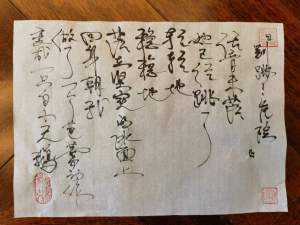
标签:animals, art, artificial, child, children, compound, daily life, danger, girl, ice, jump, lake, life, move, movement, NPC, people, poetry, reality, rock, rocks, season, supermarket, supermarkets, winter, yi sha, 新世纪詩典, 伊沙
发表在 1966, 1970s, 1980s, 1986, 1989, 1990s, 2000, 2000s, 2010s, 2011, 2012, 2013, 2014, 2015, 2016, 2017, 2018, 2019, 2020, 2021, 20th century, 21st century, April 2011, April 2012, April 2013, April 2014, April 2015, April 2016, April 2017, April 2018, April 2019, April 2020, April 2021, August 2011, August 2012, August 2013, August 2014, August 2015, August 2016, AUGUST 2017, August 2018, August 2019, August 2020, December 2011, December 2012, December 2013, December 2014, December 2015, December 2016, December 2017, December 2018, December 2019, December 2020, Februar 2017, February 2011, February 2012, February 2013, February 2014, February 2015, February 2016, February 2018, February 2019, February 2020, February 2021, January 2011, January 2012, January 2013, January 2014, January 2015, January 2016, January 2017, January 2018, January 2019, January 2020, January 2021, July 2011, July 2012, July 2014, July 2015, July 2016, JULY 2017, July 2018, July 2019, July 2020, June 2011, June 2012, June 2013, June 2014, June 2015, June 2016, June 2017, June 2018, June 2019, June 2020, March 2008, March 2009, March 2010, March 2011, March 2012, March 2013, March 2014, March 2015, March 2016, March 2017, March 2018, March 2019, March 2020, March 2021, May 2011, May 2012, May 2013, May 2014, MAY 2015, May 2016, May 2017, May 2018, May 2019, May 2020, Middle Ages, November 2011, November 2012, November 2013, November 2014, November 2015, November 2016, November 2017, November 2018, November 2019, NOVEMBER 2020, NPC, October 2011, October 2012, October 2013, October 2014, October 2015, October 2016, October 2017, October 2018, October 2019, OCTOBER 2020, poetry, September 2011, September 2012, September 2013, September 2014, September 2015, September 2016, September 2017, September 2018, September 2019, September 2020, Translations, Uncategorized, Yi Sha, 新世纪诗典, 伊沙 | Leave a Comment »
3月 25, 2021

BRETT VOLLER NÄGEL 布满钉子的木板
NPC-Anthologie 新世纪诗典
Band 1: A–J
NPC stands for New Poetry Canon, or New Century Poetry Canon 新世纪诗典, presented by Yi Sha 伊沙 in Chinese social media each day since spring 2011. NPC outside of poetry is National People’s Congress, China’s parliament that convenes in the Great Hall of the People in Beijing for two weeks each March. Yi Sha’s NPC poem of the day on Sina Weibo 新浪微博, Tencent WeChat 微信 and other platforms gets clicked, forwarded, commented 10,000 times or more, each day. Each year a book comes out, about every week there are events in Xi’an, Beijing and many, many places all over China and beyond. All produced independently from among the people 民间, not by any state organizations. This book contains poems by 81 poets listed below. This is the first volume (A-J) in a series of four books. Compiled and edited by Juliane Adler and Martin Winter, translated by Martin Winter.
ORDER HERE
Bestellen
NPC steht für New Poetry Canon, eigentlich New Century Poetry Canon, 新世纪诗典. Abgekürzt als NPC. NPC steht sonst für National People’s Congress, also der Nationale Volkskongress, Chinas Parlament, das allerdings nur einmal im Jahr im März zwei Wochen lang zusammentritt. Seit 2011 wird von Yi Sha 伊沙 im NPC-新世纪诗典 jeden Tag ein Gedicht vorgestellt, in mehreren chinesischen sozialen Medien zugleich. Oft wird ein einziges Gedicht schon in den ersten zwei Tagen zehntausende Male angeklickt, kommentiert und weitergeleitet. Ein nationaler Poesiekongress und eine umfangreiche Studie der heutigen Gesellschaft. Band 1 präsentiert 81 Autorinnen und Autoren. Wird fortgesetzt.
Cover/Umschlag etc: Neue Arche von Kuang Biao 邝飚 und 3 Grafiken von: An Qi 安琪
Autorinnen und Autoren:
A Ti 阿嚏, A Wen 阿文, A Wu 阿吾, A Yu 阿煜, AAA (3A) 三个A, Ai Hao 艾蒿, Ai Mi 艾米, An Qi 安琪, Ao Yuntao 敖运涛, Bai Diu 摆丢, Bai Li 白立, Bei Dao 北岛, Bei Lang 北浪, Benben S. K. 笨笨. S. K, Cai Xiyin 蔡喜印, Caiwong Namjack 才旺南杰, Caomu Xin 草木心, Cha Wenjin 查文瑾, Chang Yuchun 常遇春, Chao Hui 朝晖, Che Qianzi 车前子, Chen Moshi 陈默实, Chen Yanqiang 陈衍强, Chen Yulun 陈玉伦, Chen Yunfeng 陈云峰, Cheng Bei 成倍, Cheng Tao 程涛, Chun Sue 春树, Cong Rong 从容, Da Duo 大朵, Da You 大友, Dai Guanglei 代光磊, Dechen Pakme 德乾恒美, Denis Mair 梅丹理, Di Guanglong 第广龙, Dong Yue 东岳, Du Qin 独禽, Du Sishang 杜思尚, Du Zhongmin 杜中民, Duo Er 朵儿, Eryue Lan 二月蓝, Ezher 艾孜哈尔, Fa Xing 发星, Fei Qin 秦菲, Feng Xuan 冯谖, Gang Jumu 冈居木, Gao Ge 高歌, Geng Zhankun 耿占坤, Gong Zhijian 龚志坚, Gongzi Qin 公子琹, Gu Juxiu 谷驹休, Guangtou 光头, Gui Shi 鬼石, Hai An 海岸, Hai Jing 海菁, Hai Qing 海青, Han Dong 韩东, Han Jingyuan 韩敬源, Han Yongheng 韩永恒, Hong Junzhi 洪君植, Hou Ma 侯马,Houhou Jing 后后井, Hu Bo 胡泊, Hu Zanhui 胡赞辉, Huang Hai 黄海, Huang Kaibing 黄开兵, Huang Lihai 黃禮孩, Huang Xiang 黄翔, Hung Hung 鴻鴻, Huzi 虎子, Ji Yanfeng 纪彦峰, Jian Tianping 簡天平, Jiang Caiyun 蒋彩云, Jiang Erman 姜二嫚, Jiang Rui 江睿, Jiang Tao 蔣濤, Jiang Xinhe 姜馨贺, Jiang Xuefeng 蔣雪峰, Jianghu Hai 江湖海, Jin Shan 金山, Jun Er 君儿

BRETT VOLLER NÄGEL 布满钉子的木板 NPC-Anthologie 新世纪诗典 Band 1: A–J
Die chinesischen Gedichte sind hauptsächlich erschienen in:
NPC 新世纪诗典 1-6,伊沙 编选 著,磨铁图书 (Xiron), Zhejiang People‘s Publishing 浙江人民出版社, Bände 1-6, herausgegeben von Yi Sha. Hangzhou 2012-2018
NPC 新世纪诗典 7,伊沙 编选 著,磨铁图书 (Xiron), China Youth Publishing 中国青年出版社, Band 7, herausgegeben von Yi Sha. Beijing 2018
NPC 新世纪诗典 8,伊沙 编选 著,磨铁图书 (Xiron), China Friendship Publishing 中国友谊出版公司, Band 8, herausgegeben von Yi Sha. Beijing 2020
Die restlichen Texte stammen aus Internetquellen (Soziale Medien: Sina Weibo, Tencent Weixin etc.) mit freundlicher Genehmigung der Autorinnen und Autoren. Die Texte aus 2019 und 2020-2021 werden in den Büchern NPC 9 und 10 erscheinen.

BRETT VOLLER NÄGEL 布满钉子的木板 NPC-Anthologie 新世纪诗典 Band 1: A–J
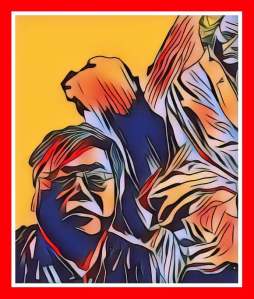



标签:3A, A Ti, A Wen, A Wu, A Yu, AAA, Ai Hao, Ai Mi, all, An Qi, animals, Ao Yuntao, Bai Diu, Bai Li, Bei Dao, Bei Lang, Benben S.K., board, bodies, body, book, books, Cai Xiyin, Caiwong Namjack, Caomu Xin, Cha Wenjin, Chang Yuchun, Chao Hui, characters, Che Qianzi, Chen Moshi, Chen Yanqiang, Chen Yulun, Chen Yunfeng, Cheng Bei, Cheng Tao, children, Chun Sue, Cong Rong, contact, continent, cracks, culture, customs, 独禽, 白立, 秦菲, 程涛, 笨笨 s.k., 第广龙, 簡天平, 纪彦峰, Da Duo, Da You, Dai Guanglei, day, Dechen Pakme, Denis Mair, Di Guanglong, discussions, Dong Yue, Du Qin, Du Sishang, Du Zhongmin, Duo Er, Eryue Lan, everything, expression, eyes, Ezher, 耿占坤, 胡赞辉, 胡泊, 金山, 艾米, 艾蒿, 艾孜哈尔, 草木心, 蒋彩云, 蔡喜印, 蔣雪峰, 蔣彩雲, 蔣濤, 阿煜, 阿吾, 阿嚏, 阿文, 陈玉伦, 陈衍强, 陈默实, 陈云峰, 虎子, 高歌, 鴻鴻, 黃禮孩, 黄翔, 黄开兵, 黄海, 黄海兮, 车前子, 龚志坚, Fa Xing, fabrik.transit, face, faces, Fei Qin, Feng Xuan, figures, food, Gang Jumu, Gao Ge, Geng Zhankun, Gong Zhijian, hearts, history, Hong Junzhi, Hou Ma, Houhou Jing, Hu Bo, Hu Zanhui, Huang Hai, Huang Haixi, Huang Kaibing, Huang Lihai, Huang Xiang, Hung Hung, Huzi, island, islands, Ji Yanfeng, Jian Tianping, Jiang Caiyun, Jiang Erman, Jiang Rui, Jiang Tao, Jiang Xinhe, Jiang Xuefeng, Jianghu Hai, Jin Shan, Juliane Adler, Jun Er, language, languages, life, literature, Martin Winter, mask, masks, Mediterranean, memory, men, minds, mountains, mouth, nail, names, night, NPC, pages, paper, people, performance, plain language, poetry, politics, province, religion, ritual, rivers, society, spirit, taiwan, Taiwanese, territory, Tibetan, tongue, translation, Uighurs, voice, volume, women, wood, words, writing, year, yi sha, youth, 冈居木, 冯谖, 北岛, 北浪, 发星, 后后井, 君儿, 大友, 大朵, 姜馨贺, 姜二嫚, 安琪, 常遇春, 德乾恒美, 成倍, 才旺南杰, 摆丢, 敖运涛, 新世纪詩典, 春树, 朝晖, 朵儿, 杜思尚, 杜中民, 查文瑾, 梅丹理, 江睿, 江湖海, 洪君植, 三个A, 东岳, 二月蓝, 从容, 代光磊, 伊沙, 侯马
发表在 1940s, 1950s, 1960s, 1970s, 1980s, 1990s, 2000, 2000s, 2001, 2002, 2003, 2004, 2005, 2006, 2007, 2008, 2009, 2010, 2010s, 2011, 2012, 2013, 2014, 2015, 2016, 2017, 2018, 2019, 2020, 2021, 20th century, 21st century, Antique times, April 2011, April 2012, April 2013, April 2014, April 2015, April 2016, April 2017, April 2018, April 2019, April 2020, August 2011, August 2012, August 2013, August 2014, August 2015, August 2016, AUGUST 2017, August 2018, August 2019, August 2020, December 2011, December 2012, December 2013, December 2014, December 2015, December 2016, December 2017, December 2018, December 2019, December 2020, Februar 2017, February 2012, February 2013, February 2014, February 2015, February 2016, February 2018, February 2019, February 2020, February 2021, January 2012, January 2013, January 2014, January 2015, January 2016, January 2017, January 2018, January 2019, January 2020, January 2021, July 2011, July 2012, July 2014, July 2015, July 2016, JULY 2017, July 2018, July 2019, July 2020, June, June 2011, June 2012, June 2013, June 2014, June 2015, June 2016, June 2017, June 2018, June 2019, June 2020, Literadio, March 2011, March 2012, March 2013, March 2014, March 2015, March 2016, March 2017, March 2018, March 2019, March 2020, March 2021, May 2011, May 2012, May 2013, May 2014, MAY 2015, May 2016, May 2017, May 2018, May 2019, May 2020, Middle Ages, November 2011, November 2012, November 2013, November 2014, November 2015, November 2016, November 2017, November 2018, November 2019, NOVEMBER 2020, NPC, October 2011, October 2012, October 2013, October 2014, October 2015, October 2016, October 2017, October 2018, October 2019, OCTOBER 2020, poetry, PR, September 2011, September 2012, September 2013, September 2014, September 2015, September 2016, September 2017, September 2018, September 2019, September 2020, Translations, Uncategorized, 安琪, 新世纪诗典, 江湖海, 三个A, 伊沙, 侯馬 | Leave a Comment »
8月 31, 2016
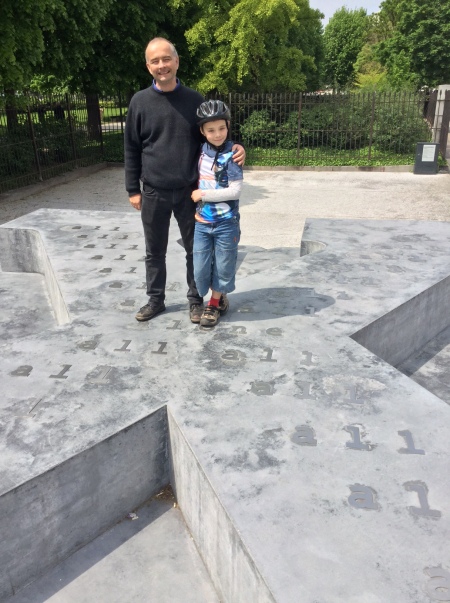
photo by David Howard
SONNTAG IN DER KIRCHE
ich war am sonntag nicht in der kirche
die kirche war am ballhausplatz
nicht heldenplatz aber auch dort
gegen die mit dem ball
weiß nicht wieviele waren
vielleicht auch niemand von unseren freunden
obwohl niemand deutschdümmler wählt
der bei trost ist
aber der glanze heldenplatz zirka
ist lang nicht gewonnen
wieviele waren
bei trost oder was
wieviele waren am sonntag
wahrscheinlich ist es auch nicht entscheidend
im stadtpark wär ich auch gern gewesen
josef hader paul gulda
es war heiß
vielleicht der letzte heiße sonntag im sommer
also stadionbad
alte bäume
manche zweihundert jahre
wie alt ist das stadion
wie alt ist das bad
das bad schaut ein bisschen aus wie die stadthalle
obwohl alles im freien
es ist genug platz
irgendwo hinten kannst fussballspielen
auch wennst im wasser fast nicht mehr durchkannst
aber irgendwie gehts
gott hat geruht am siebten tag
wir haben geruht ins wasser zu gehen
geruht uns zu sonnen
14 euro zwei große zwei kinder
das essen dort natürlich nicht billig
am ende bist müde
der platz bei der u-bahn hinter dem stadion
da steht ein container schon einige jahre
wiener schachverein oder so
der platz ist nach einem meister benannt
der starb in der emigration
das straßenschild ist überklebt
vielleicht fußballfans
die vielleicht nichts verstehen
ich war am sonntag nicht in der kirche
MW 31. August 2016
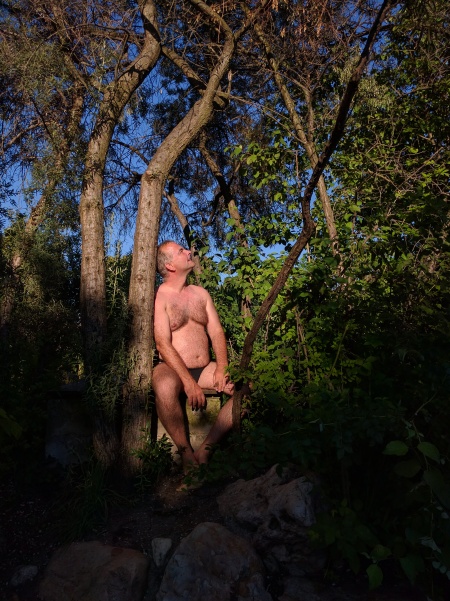
Photo by Ronnie Niedermeyer, rn.co.at
标签:alone, architecture, August, austria, bad, ball, bodies, cabaret, chess, children, church, constitution, culture, death, election, emigration, Ernst Jandl, Europe, exile, family, Fascism, food, football, fun, gathering, government, Heldenplatz, history, hot, ideology, language, literature, master, memory, money, music, old, outdoor, poetry, politics, pool, Prater, president, refugees, religion, soccer, sports, square, Stadionbad, stadium, Stadthalle, Stadtpark, summer, sun, sunday, swimming, trees, Vienna, vote, water
发表在 1933, 1934, 1938, 1945, 1955, 1966, 1970s, 1980s, 1990s, 2008, 2010, August 2015, August 2016, January 2008, January 2009, January 2011, January 2012, January 2013, January 2014, January 2015, January 2016, July 2016, June 2016, March 2016, May 2016, November 2015, October 2015, October 2016, poetry, September 2015, September 2016, Uncategorized, Welcome! | Leave a Comment »
1月 28, 2013
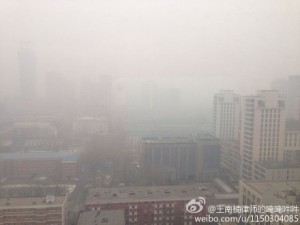
drache ade
der mond ist ungeheuer oben.
der drache ist bald nicht mehr da.
am spielplatz sehen wir noch den mond.
es war ein schoener nachmittag
mit kleinem bob im belvedere.
der schnee ist jetzt schon laenger da.
die rampe bei den stufen rechts
wenn man hinaufgeht. leo fuhr
auf maias kleinem leichtem bob
vom schiurlaub in kaernten noch.
es war ein schoener ruhiger platz
und niemand stoerte sich an uns.
und eine mexikanerin.
der erste schnee, ganz frisch in wien
mit ihrem freund. der kann gut deutsch
er wohnt auch hier. sie fragten uns
und leo liess sie einmal fahren
und sogar beide je einmal.
der mond ist ungeheuer oben
ein bisschen hoeher als im herbst.
der letzte mond im drachenjahr
das fruehlingsfest ist heuer spaet
es kommt am zehnten februar
der mond ist ungeheuer oben
ein bisschen hoeher als im herbst.
das drachenjahr war ganz ok
mehr wasser als beim letzten mal
es rannte damals jiang zemin
mit fackel in die neue zeit
auf dem milleniumsmonument
jetzt gibt es schon den xi jinping
viel wichtiger: es gibt mo yan
man ahnte beides lang davor
beim letzten mal wars gao xingjian
das war im letzten drachenjahr
recht lang ists her. 12 jahre frueher
da war ich in taiwan
die 80er jahre
das letzte jahr vor 89
hat da shen congwen noch gelebt?
der haett es auch noch fast gekriegt
in stockholm, aus des koenigs hand
fuer literatur aus den vierziger jahren
und dreissiger jahren. vor 49.
jetzt gibts in deutschland liao yiwu
aus taiwan kamen lai hsiangyin
und chen kohua unlaengst nach wien
in taiwan ist viel hoffnung da
in china ist die luft recht dick
der mond ist ungeheuer oben
ein bisschen hoeher als im herbst
das drachenjahr war ganz ok
mehr wasser als beim letzten mal
in peking wars sogar zuviel
im juli, mit ertrunkenen.
zum abschluss wurde es sehr kalt
am ende kam ein schlimmer smog.
war es ein gutes drachenjahr?
ich weiss es nicht. wir sind in wien
in wien gibts haeupl weiterhin
und bundesheer. an seinem platz
und wenigstens nicht fuer den krieg.
der mond ist ungeheuer oben
den fluechtlingen ist ziemlich kalt
vor 20 jahren: lichtermeer
ich war in china. doch davor
nach 89 bald danach
war ich in wien. da war der loeschnak an der macht.
der cap war auch schon funktionaer.
das boot war voll. das sagte wer.
es gab die plakate
gesetze statt hetze
als auslaenderhetze.
das als das das statt war
das wollte ich kleben
auf alle plakate. in einer nacht.
ein bisschen wie bei ai weiwei.
ich hatte nicht genuegend freunde.
dann kam der krieg. jugoslawienkriege.
und ich war in shanghai.
dann war ich zivildiener, lehrer
fuer fluechtlinge aus bosnien.
doch nur weil ich wollte.
der grissemann hat nichts getan.
vielleicht aber spaeter.
es gibt nichts gutes. man tut es.
von kaestner. wie war das?
dann ging ich nach wuhan.
und spaeter nach chongqing.
dazwischen war rumaenien.
wir lernten und lehrten.
wir kamen nach peking.
und jackie ging zum militaer.
militaer in der botschaft.
und alles ganz friedlich.
und ich uebersetzte
dann waren schon die kinder da.
der mond ist ungeheuer oben
ein bisschen hoeher als im herbst
der letzte mond im drachenjahr.
ich muss jetzt endlich schlafen gehen.
MW Sa., 26. Jaenner 2013
标签:1980s, 1990s, 2000, 2012, austria, beijing, china, diary, life, literature, military, moon, Nobel prize, politics, taiwan, Vienna, weekend
发表在 January 2013, Uncategorized | 1 Comment »
1月 22, 2013

Yi Sha
SPRING SNOW
when I was prepared
to enter spring
it snowed again
every snow
brings good feelings
makes me pray
dear god
for suicides tomorrow morning
let it snow once more
they need it
2005
Tr. MW 2013/1
伊沙
春雪
在我做好了準備
走進春天的時候
又下了一場雪
每一場雪
都會帶來好心情
它讓我祈禱–
老天爺
為明天早上的自殺者
在下一場吧
他們需要
2005
2008年开始翻译了几首,瑞士NZZ他们要很短的,所以最近给他们寄 《春雪》等等,从《尿床》一本台湾版选几首最短的。有《精神病患者》、《感恩的酒鬼》、《致敬》、《我想杀人》、《鸽子》等等。也许他们还会登出一两。 2008年偶尔读《雪天里的几种事物》,很喜欢,翻译了以后寄给报刊,他回答说很喜欢,不过一直未登出,太长。译文可以查看在这里。
More poems by Yi Sha in German
Yi Sha became well-known in the 1990s for acerbic remarks on other poets. He has been widely criticized himself. Spring is a time of hope. The Chinese moon year begins with Spring Festival, the biggest holiday of the year. Typically for Yi Sha, this poem sounds rather mundane, laconic and depressing, dashing most expectations connected with poetry. The line “For suicides tomorrow morning” is a little truncated in my German version that was printed in the Neue Zürcher Zeitung (see image). “Für die Selbstmörder von morgen” makes a better rhythm than “Für die Selbstmörder von morgen früh”. In English I wasn’t tempted to leave out the morning. But you could say “dear god/for suicides in the morning/ let it snow once more.” In German there is something like a rhyme within the first two lines. When I was prepared/ To stride into spring/ it snowed again. Does it sound better this way in English too? You decide.
Why did I pick this particular poem? I didn’t pick it for publication. Andreas Breitenstein at NZZ (Neue Zürcher Zeitung) likes to print poems whenever he can wrangle a little space in any particular day’s edition. They have to be short. I had translated another poem by Yi Sha about snowfall in 2008. Mr. Breitenstein liked it, but it was too long. So I looked through Yi Sha’s collection Niao Chuang 尿床 (Wetting the bed), published in Taiwan in 2009. It’s a very nice edition. Huang Liang 黃梁, a critic in Taiwan, has brought out two ten-volume Series of Mainland Avantgarde Poetry 大陸先鋒詩叢, in 1999 and 2009. A great resource. I just picked some of the shortest poems in there.
标签:art, china, Chinese poetry, 生活,gedichte, death, holidays, life, literature, new year, poetry, religion, snow, spring, spring.catastrophies, suicide, winter
发表在 January 2013, Translations, Uncategorized | 3 Comments »
1月 20, 2013
Für Zivildienst. Und ein Bundesheer mit breiter Bevölkerungsbasis. Wenn überhaupt ein Heer. Aber zur Polizei hab ich kaum Vertrauen. Wir sind neutral. Nicht bei der NATO. Vertrau ich der Polizei? Warum soll ich einem Berufsheer vertrauen? Wir gehen jetzt zur Flüchtlingsdemo. 13:30 beim Volkstheater. Bis dann, alles Gute. Martin 

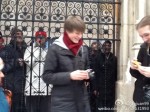


We had a vote about our military in Austria on the weekend. And a demonstration for refugees on hunger strike. Complete with a huge Sachertorte. For the protesters. In commemoration of the “Lichtermeer” against racism and xenophobia in Vienna 20 years ago. I didn’t know if I was going to vote, on Sunday morning. So I got Jackie to call our old friend, Gen. A., her employer in Beijing. The Social Democrats wanted to abolish the draft. But some prominent Social Democrats wanted to keep it, incl. the president. General A. is Social Democrat. But he said if the draft is abolished, they will only get certain segments of the population as recruits. You can do all sorts of other things instead of going to the army. Work in a hospital, teach German to refugees (what I did), even go to Qiqiha’er 齊齊哈爾 for a year. (Here is another report in German, translated from 齊齊哈爾日報)。 It’s not that bad if every healthy young man is required to do something for the community. That was my reasoning. When I did that alternative community service thing, we had to do some training at first for being able to help in case of floods, storms etc. That boat thing was fun. The guy in our group whose parents were in the far-right Freedom Party volunteered and was the first to try and row to an island in the icy Danube. Boat leaked. He didn’t get very far. They sent him to hospital. He was ok. Later on he had to teach German to refugees, helping me. He wasn’t bad, they liked him. He really tried, and I’m quite sure his attitude to refugees etc. changed.
标签:austria, civil rights, civil society, democracy, demonstrations, Europe, migrants, military, news, police, politics, refugees, society, solidarity, Vienna
发表在 January 2013, Uncategorized | 1 Comment »
1月 15, 2013
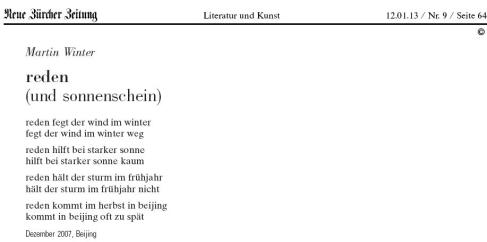
speech and rain
speech is swept by wind in winter
swept away by wind and gone
speech would hardly help in summer
hardly help against the sun
speeches held by storms in springtime
storms in springtime hold no speech
speech will come in fall in beijing
speech in beijing, always late
MW June 2012, Vienna
See also https://erguotou.wordpress.com/reden/
Every country or region has repressed issues. 有時候被壓抑的事偶爾出頭。奧地利前內政部長剛被判4年徒刑。 A 14-year old boy was shot dead for breaking into a supermarket in Austria in 2009. The policeman who ran after him and shot him in the back is still on duty. The facade of the Konzerthaus in Vienna says “Honor your German masters and ban good spirits”. Whom or what did they ban in the 1930s and 1940s? This poem is from Beijing. We lived in Beijing 1999-2008.

Photo by Andreas Landwehr, dpa
reden (und sonnenschein)
reden fegt der wind im winter
fegt der wind im winter weg
reden hilft bei starker sonne
hilft bei starker sonne kaum
reden haelt der sturm im fruehjahr
haelt der sturm im fruehjahr nicht
reden kommt im herbst in beijing
kommt in beijing oft zu spaet
MW Dezember 2007, Beijing
http://blogs.yahoo.co.jp/dujuan99nihon/5984001.html
德語雨regen和說話、言論、發言reden很像。07年跟在歐洲的家人溝通有問題而想到这首。
北京12年七月洪水記得嗎?

北京周围從來缺乏雨水。全國缺乏很多言論。

标签:beijing, catastrophies, communication, Europe, fall, family, freedom of speech, rain, seasons, speech, spring, summer, sun, weather, wind, winter
发表在 January 2013, July 2012, Uncategorized | 1 Comment »
1月 9, 2013
Song Tik-lai 宋澤萊
FAREWELL TO THE 20th CENTURY
Thank you, 20th century
We all grew up some time with you
I was born and grew up too
In your arms I feel at home
In your last year
You are generous
To set me free
One hundred years
Two world wars
Cold war east-west
Countless other wars and conflicts
I don’t have much experience
I carried my gun
Two years military service
Thank heavens
I stayed alive
One hundred years
One economic depression
America’s streets full of beggars
Some nations went hungry
Russia and China adopted
Communism
I have only shallow experience
When I was small
There was no rice
But there were dried sweet potatoes
Thank you
I didn’t stay hungry
Although malnourished
There was political tragedy
Military dictators
Even governing through terror
Countless people
Went to jail
Wailing was heard on
The earth’s every corner
I have limited experience
Held and carried
Flags and banners
Walked in streets
Of silent protests
There was art in various ways
Dadaists and surrealists
Stream of consciousness, expressionism
Existentialism, postmodernism
Baffling and shouting, collapsing
Suicide and going crazy
I don’t have much experience
Still at my desk
With simple words
Writing my poems
I went to Grandpa’s grave
One hundred years of graves and mounds
Thousands and millions
Buried simply
Left in the 20th century
Wrongs and grievances abroad
I don’t know much and beg your pardon
I went through this time
And stayed alive
20th century
I don’t count as your victim
Listen, century
I’m not qualified
To raise my voice
In blame
But begging your pardon
At night when the Milky Way blazes
Raising my head
I often think of
Flying away
Tr. Martin Winter, Jan. 2013
With help from Khinhuann Li 李勤岸
宋澤萊
告別二十世紀
感謝二十世紀
庶呢長e時間
予我會凍出世、生長
值妳e懷中我感覺有歸屬
最後e這年
妳寬宏大量
予我離開
一百年
有兩遍世界大戰
東西冷戰
無數e大小戰爭
庶我呒是攏有體驗
干擔八揭搶
做二年e 兵
感謝天
我平安度過
一百年
有一遍經濟大蕭條
美國滿街攏乞食
有人民大飢荒
露西亞、中國實行
共產主義
我e 體驗真淺
干擔值囝仔時代
無米通食
但是,猶有番薯簽
感謝
我無飫著
雖然有卡欠營養
有真濟e政治悲劇
軍人獨裁
甚至恐怖統治
有算朆了e志士
入監牢
哭聲值地球e
每一個角落
我e 體驗無深
干擔八揭
幾遍旗仔
值街仔路
恬恬抗議
有真濟藝術
達達、超現實
意識流、表現主義
存在主義、後現代主義
迷惑、喝喊、瓦解
自殺、起犭肖
我呒是攏有體驗
猶原值桌子頂
用尚簡單e字
寫我e 詩
我八去阿公埋骨e
百年大墓仔埔
歸千歸萬人
埋值土腳
亻因值二十世紀留落
外濟e委屈
原諒我呒是完全清楚
我猶原值世間
繼續活落去
二十世紀
我假那受害無夠深e
世紀
無資格大聲
責備
但是,原諒我
值夜晚銀河燦爛e時
揭頭
我不時道想卜
飛離開妳
标签:1999, 2000, 20th century, 21st century, art, death, hunger, literature, poetry, politics, poverty, protest, Song Tik-lai, taiwan, Taiwanese, terror, war, 宋澤萊
发表在 1999, 2000, January 2013 | 3 Comments »
1月 7, 2013
Please click on the image

My favourite comments on Mo Yan in the last few months are in the article by Liu Jianmei (刘剑梅), published in FT Chinese on Dec. 11 and posted on the MCLC list on Dec. 19. The title asks something like ‘Does literature still work like a shining light?’ Maybe my translation is not too bright. Should literature be a shining lantern? That’s one of the questions in Liu’s article. Literature and art were thought of as relevant to society and the nation in the 1980s. Liu talks about different approaches and relationships of life and art. Mo Yan deserves careful reading, just like Yan Lianke and Lu Xun. Nothing more or less. Liu uses “Save the cildren”, the last line from Lu Xun’s Diary of a Madman, for a close look into Mo‘s works as well as Yan Lianke’s latest novel Four Books (not published in Mainland China). The main characters of Republic Of Wine and Frogs are unable to save the children, like Lu Xun’s narrator. Republic of Wine features cannibalism and a riotous carnival of language. It’s my favorite among Mo Yan’s novels, along with The Garlic Ballads.
What is art? What is it for? A little more than 100 years ago now, the Dadaists (in voluntary exile in Switzerland and other places) concocted a virtual antidote to the First World War. Words, ordinary and exalted speech, had lost any meaning in the collective carnage. Not much later, Hu Shi, Zhou Zuoren, Lu Xun etc. attempted to change the Chinese language, in written form and on stage. Yomi Braester shows in Witness Against History how Lu Xun’s most famous passages retain ambiguities that belie any straight nationalist reading, even if the author himself would have read them that way. I like the crazed language of the Madman. Republic of Wine, more experimental than any other works by Mo (to my knowledge), goes into that direction. In Bei Dao’s Rose of Time (Shijian de meigui), a collection of essays that appeared in Shouhuo (Harvest) magazine in the early 2000s, when Bei slowly became acceptable in China again, he writes about Pasternak and Mandelstam. In his youth, Pasternak praised Stalin. Later he tried to extricate other writers from the Gulag, with mixed success. Mandelstam believed in Communism all the way to his death in a labor camp. Bei Dao doesn’t say that. But the chapter on Pasternak invokes Russian Formalism and Structuralism that grew out of the abortive 1905 revolution. Art makes reality appear strange and different, enabling the spectator to perceive it more clearly. And the flag of art is always different from the flag on the citadel.
Republic of Wine is wilder than the real Mo Yan on the Nobel stage. When the real Mo (sounds funny, doesn’t it? The real NO, or the real NOT, like NOT A WORD), when the real Mo Yan talked about his mother, I was moved. It sounded like my grandmother in rural Austria around 1920. Sometimes she couldn’t go to school in winter because she had no shoes. But Mo Yan also said his mother was afraid he would “leave the collective” with his storytelling. Qunti 群体, the masses, the collective, could that be called an example of Mao wenti or Mao-ti, Mao-Speak in this usage? Actually not, qunti 群體 is an older word, could have been used by Li Dazho and other founders of the Chinese Communist Party, before Mao, Prof. Weigelin told me recently here in Vienna. She was right, I encountered qunti in another text I liked very much, was it by Yu Hua? Anyway, I was rather baffled when Perry Link related how a mother would tell her child on the bus to “jianchi 堅持”, to hold it until the driver could stop and let the child out to go to take a leak. Would “jianchi” really sound strange outside of Mainland China? But the discussions about Mao-style are still relevant – Mo Yan is an establishment figure nowadays, and generates critique of China’s established system in general.
I was a little surprised when Chinese critics of Mo Yan talked about the carnivalesque language in his novels. As if you had to be careful not to lose yourself in there. I did think of Mikhail Bakhtin and his concept of carnival in Dostoyevsky’s novels when I read Republic of Wine. But as far as I remember, Bakhtin had defended language and storytelling that would sound strange and crazy, as opposed to Socialist Realism. So when was Mo Yan’s writing first associated with carnival? Maybe in the 1980s? And how did this association evolve?
A few days after the recent massacre in a primary school in Connecticut, Ross Douthat in the New York Times talked about Dostoyevsky’s Brothers Karamazov. Although Dostoyevsky was a Christian, Douthat says, the senseless cruelty against children in the novel is just cruelly senseless, there is no “rhetorical justification of God’s goodness”. You have to look at the behaviour of characters who show “Christian love” to find any counterpoint. Below this op-ed, there are 121 reader’s comments, all within one day. Many say they want to talk about guns, not literature.
What is literature for? Why is there a Nobel for literature, but not for music or fine art? Or films? Nobels make for debate. Very much debate, in this case. Great.
标签:children, china, cruelty, literature, media, Nobel prize, politics, religion, theory
发表在 December 2012, January 2013 | 2 Comments »
1月 7, 2013

VIELFARBIGE TAGE
(Malfarben von Dr. Seuss, für Jackie und Maia)
manche tage sind gelb, manche sind blau.
so ist es mit mir, so bin ich genau.
ungleiche tage, in ungleichen farben
und ich werde anders, das ist keine frage.
an hellroten tagen ein pferd zu sein
sich auszutoben und auszuschlagen!
an anderen tagen mit anderen dingen
an hellblauen tagen heb ich meine schwingen.
an manchen tagen, nicht an den bunten
da fühl ich mich langsam und ziemlich weit unten.
dann kommt ein gelber tag. ich bin auf schiene
ich bin die schnelle geschäftige biene.
ein grauer tag. alles ist grau.
gar nichts bewegt sich, wohin ich auch schau.
dann plötzlich hab ich den seehunde-tag
orangener zirkus. ich tu was ich mag.
grüne tage im meer. tief unten und kühl.
ich bin ein fisch. frisch und still.
an lila tagen muss ich traurig sein.
ich seufze und stöhne. ich bin allein.
doch rosige tage, da kann ich springen.
ohne zu denken kann alles gelingen.
ein schwarzer tag. hab die nase voll.
ich groll jeder wolke und heule ganz toll.
dann kommt ein tag, da ist alles drin.
und wumm! bin verwirrt, weiß nicht wer ich bin.
doch es wird gut, du wirst es verstehen.
ich werd einfach ich! du wirst schon sehen.
Übersetzt von MW, 6. Jänner 2013
 On Bright Red Days how good it feels
On Bright Red Days how good it feels
to be a horse and kick my heels.
Some days, of course, feel sort of Brown.
Then I feel slow and low, low down.
Then come my Black Days. Mad. And loud.
I howl. I growl at every cloud.
 Green Days. Deep deep in the sea.
Green Days. Deep deep in the sea.
Cool and quiet fish. That’s me.
Gray Day…Everything is gray.
I watch. But nothing moves today.
标签:children, family, life, poetry, translation
发表在 January 2013 | 1 Comment »











































